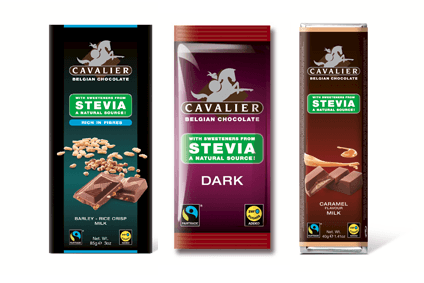
Belgian chocolate maker Cavalier plans to rebrand its range of all-natural sugar-free chocolates to extend its mainstream appeal and increase the prominence of the brand message.
Founded in 1996, Cavalier has experienced sales growth of more than 50% over the last three years. Currently, the group exports products to 55 countries worldwide including Europe, the Middle East and the Far East.

Discover B2B Marketing That Performs
Combine business intelligence and editorial excellence to reach engaged professionals across 36 leading media platforms.
The group has set its sights on increasing market penetration across its markets and also plans to launch in the US this September, William Devliegher, eastern Europe sales manager, tells just-food.
As part of this expansion drive, Cavalier is working on a brand refresh that it hopes will extend its consumer appeal by “softening” the sugar-free and premium messaging and bringing the Cavalier brand to the fore.
“Its a premium product, at least it was always positioned. But now, with the new packaging it will be premium but a little bit less. We are downgrading it a little. You can still see it’s Belgium chocolate but we are moving it into the mainstream and bringing the focus on to the brand,” Devliegher says.
The company has not yet determined how the roll out of the new branding will be executed because of the differing needs of the various markets in which it operates.

US Tariffs are shifting - will you react or anticipate?
Don’t let policy changes catch you off guard. Stay proactive with real-time data and expert analysis.
By GlobalData“We are still working out how to make the transition. Scandinavia, northern Europe, western Europe it might be by 2015. Eastern Europe it will be later,” Devliegher suggests. “In Russia, we have customers who say they need that premium in order to establish demand.”
As demand for sugar-free chocolate becomes more mainstream, Devliegher does expect competition will heat up. However, Cavalier is currently one of the few companies to have developed a chocolate product that uses a natural sugar replacement – Stevia.
The chocolate recipe was developed in partnership with Barry Callebaut and Cavalier holds exclusivity rights until the end of this year. Cavalier owns the intellectual property rights for all of its fillings.
For Cavalier, this unique recipe is an important point of difference to other sugar-free chocolate makers, who use artificial sweeteners such as maltitol, Devliegher says. The company’s unique recipe also carries additional health benefits and contains microfibres that are “under-consumed”.
“These fibres are used as a carrier but also with an additional health benefit.”
Cavalier intends to strengthen its brand recognition, building consumer loyalty and protecting its intellectual property rights, before demand for sugar-free chocolate reaches a size where the sector attracts the attention of bigger rivals, Devliegher suggests.
“[Big players] would have to find a whole line that could be dedicated to sugar-free. They would have to be constantly cleaning it. I don’t think the volumes are there yet for the likes of Lindt – for example – to say it is worth it. It would cost them too much to do the cleaning, to do the packaging, to justify going into the market.”
If and when the sugar-free sector does attract the attention of larger chocolate makers, Cavalier intends to be prepared to fend off the competition.





